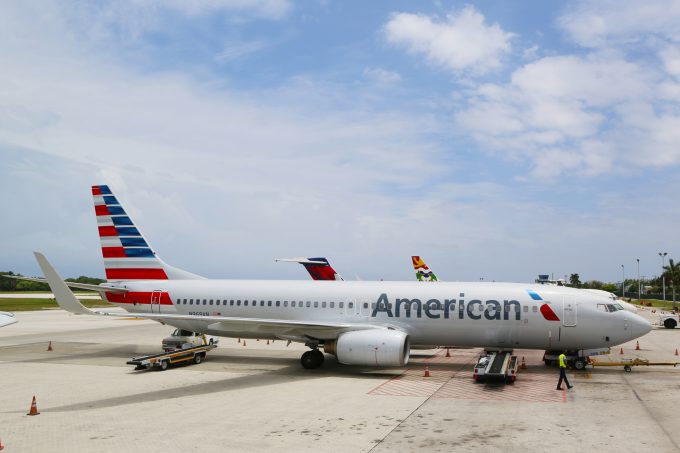US mega-airlines grow cargo volumes, but miss out on ecommerce boom
The three US mega-airlines – Delta, United and American – expanded their cargo traffic in ...
TFII: SOLID AS USUALMAERSK: WEAKENINGF: FALLING OFF A CLIFFAAPL: 'BOTTLENECK IN MAINLAND CHINA'AAPL: CHINA TRENDSDHL: GROWTH CAPEXR: ANOTHER SOLID DELIVERYMFT: HERE COMES THE FALLDSV: LOOK AT SCHENKER PERFORMANCEUPS: A WAVE OF DOWNGRADES DSV: BARGAIN BINKNX: EARNINGS OUTODFL: RISING AND FALLING AND THEN RISING
TFII: SOLID AS USUALMAERSK: WEAKENINGF: FALLING OFF A CLIFFAAPL: 'BOTTLENECK IN MAINLAND CHINA'AAPL: CHINA TRENDSDHL: GROWTH CAPEXR: ANOTHER SOLID DELIVERYMFT: HERE COMES THE FALLDSV: LOOK AT SCHENKER PERFORMANCEUPS: A WAVE OF DOWNGRADES DSV: BARGAIN BINKNX: EARNINGS OUTODFL: RISING AND FALLING AND THEN RISING

American Airlines is scaling back its China presence in a deteriorating market, the latest sign of the clouds looming over US-China business.
Worries are growing in the US business community about the escalating trade conflict between Washington and Beijing – almost 360 individuals are scheduled to speak this week during six days of hearings in Washington on the next round of tariffs, with most opposed to new levies.
The US Chamber of Commerce has led the charge with a sharp criticism of the Trump administration’s stance, stating that “American businesses and consumers are bearing the brunt of the emerging global trade war”, and that the stand-off threatens to hurt the US economy.
“By now it’s plain to see that tariffs are inflicting harm on the American economy and will continue to do so unless the administration changes course,” the organisation declared on its website.
“The administration is threatening to undermine the economic progress it worked so hard to achieve,” commented the organisation’s president, Tom Donohue, in a statement.
One US sector that stands to be hurt by the tariffs is the seafood and lobster business. For some of the lobster fisheries, China accounts for 20% or more of their business.
As their Canadian competitors face far lower tariffs, US lobster fishermen expect to lose out. This month, First Catch, a Chinese-owned seafood forwarder based at Halifax Stanfield Airport, mounted twice-weekly B747-400 freighter flights from the Canadian city to Changsha, in Hunan province.
International business leaders have also warned about repercussions for the US economy as well as on global business. Maersk CEO Soren Skou said tariffs would hurt the US more than the rest of the world.
Andrew Mackenzie, CEO of BHP Billiton, added that other nations eager to trade with China would fill the gap left by Washington, while US companies stand to lose out. He also predicted that the rise of barriers against trade would have a dampening effect on the global economy.
BHP has revised its own near-term world growth forecast in light of the anticipated negative impact of rising trade protection. Instead of 3.5-4%, it now projects a rate of 3.25-3.75%.
Even Norway is blaming the Trump administration for a decline in visits by Chinese tourists, which were down 15.2% in June. The country’s marketing bureau, Innovation Norway, argues that this is the result of extreme caution by Chinese consumers in the face of the trade conflict and the weakening of their currency.
Negotiations between US and Chinese delegations resumed in Washington yesterday, after a two-month gap, but nobody expects any significant progress as no senior officials are involved. Moreover, the US government seems emboldened by news of a weakening Chinese economy.
One US company less upbeat on China is American Airlines. In a revamp of international operations, the carrier is suspending two China routes.
American announced on Tuesday it would suspend its Chicago-Shanghai flights in late October. This follows the decision made in May to stop flying Chicago-Beijing this autumn. It is also scaling down frequency on the Chicago-Tokyo sector.
“These adjustments to our Asia service are necessary in this high fuel cost environment, said Vasu Raja, vice-president of network and schedule planning.
Neel Shah, senior vice-president global airfreight at Flexport, reckons the decision is due to lower passenger demand and strong competition on the route.
“As far as cargo goes, it represents a very small sliver of the total capacity between China and the US Midwest, so I would expect zero repercussions , but it will remove one good express option for smaller shipments,” he said.
Comment on this article
J. Smith
August 27, 2018 at 4:28 pmCurious if you also wrote any articles on the harm that heavy regulations put a damper on the US economy under the prior administration?